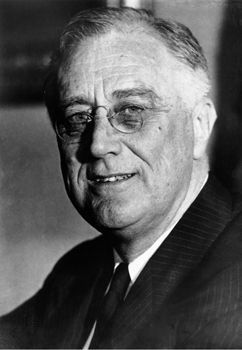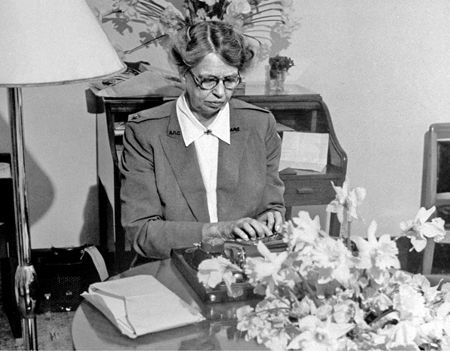Unbeknownst to him, Franklin Delano Roosevelt is waiting to deliver the last campaign speech of his long and storied political career. Red, white, and blue bunting covers the stadium. The surface of the old ballpark is dark. Roosevelt stands tall atop the speaker’s platform in center field, stretched up to his full six-foot-two height, awash in the cheers of forty thousand Bostonians and bathed in brightness by giant spotlights shining down from atop the roof.
FDR has been president of the United States for nearly twelve long years—and is just days away from being elected to a record fourth term. He wears a gray fedora and thick gray overcoat on this brutally cold autumn night. His legs are withered and weak from the polio that has long ravaged his body. Even with steel braces encircling his hips, thighs, and knees, FDR must grip the lectern to balance himself.
“This is not my first visit to Boston,” Roosevelt reminds the crowd, gently trying to calm their boisterousness. The president’s subtle request for quiet is spoken into the microphone in that genteel upper-crust voice that these working-class men and women recognize from the radio.
But the good people of Boston refuse to sit down and let him speak. Most have never glimpsed the president in person until this moment. Indeed, many have only heard his voice and seen his picture in the Boston Globe.

President Franklin Delano Roosevelt
“Free admission,” reads the ticket that got them all into the ballpark on this cold Saturday night. “Bring your friends.”
And they did.
The voices of those cheering are made up of men too old to fight, veterans home on leave, rosy-cheeked young children, and “Gold Star” mothers—those mournful women who have lost a son in combat.
The night is being broadcast nationwide on the radio. Festivities began with the twenty-eight-year-old Italian American matinee idol Frank Sinatra singing the national anthem. Sinatra’s given name is Francis, but he claims that he was inspired to name his newborn son, Frank Jr., after the president. “What a guy,” Sinatra marvels after his performance, referring to Roosevelt. “And boy does he pack ’em in.”
Despite the adoration of the public, Roosevelt is not a man of the people. He was born into wealth and privilege and has never known hard labor. As a young man, FDR collected stamps and shot birds, which he then stuffed himself and put on display. These are his hobbies to this very day. The president still spends his free time tending to the more than one million stamps in his possession, and his ornithological collection is on display at the family home in Hyde Park. Somewhat ironically, he speaks fluent German, thanks to his early years of schooling in Germany, near the warm springs at Bad Nauheim, where his father temporarily moved the family so that the elder Roosevelt might recuperate from a heart problem. The cure did not take, and FDR’s father died when Franklin was just eighteen, leaving the future president a sizable inheritance that would ensure him a life of luxury. His wealth made him stuffy and elitist, even as his foppish behavior led his cousin Alice Roosevelt, daughter of Franklin’s macho distant cousin Teddy, to sneer that FDR was a “Good little mother’s boy.” She took to insulting FDR’s manhood even further by giving him the nickname Miss Nancy.1
At age twenty, Franklin married Eleanor Roosevelt, his fifth cousin and the niece of Teddy Roosevelt. While he was at first madly in love with Eleanor, he found his affection soon waned. FDR is a man who craves constant approval, and he chafed at Eleanor’s constant criticism. The range of her scorn included their bedroom activities. Although their fruitful marriage has produced six children, Eleanor once stated that sex with FDR was an “ordeal to be endured.” Their relationship is now a platonic political arrangement—as it has been since Eleanor caught Franklin having an affair with her social secretary almost thirty years ago.
The American people know none of this. Despite FDR’s upper-crust mannerisms, his public policies have done much to benefit the working class, and the folks love him. In Roosevelt, they see the man who led the nation out of a crippling economic depression. They see a president who brought the nation together in the devastating wake of the Japanese surprise attack on Pearl Harbor. They see a president who has gone to great lengths to assist the German Jews who are now being persecuted in their homeland, even going so far as to recall the American ambassador to Germany, thus enduring the rage of American anti-Semites. And they see the commander in chief who has guided the country so skillfully through three long years of war. The good people of Boston have turned out in force this evening to show their gratitude.

Eleanor Roosevelt at work
“I shall not review all my previous visits. I should have to go on talking for several days to do that,” Roosevelt says into the microphone, the veteran politician making a joke in the hope that a ripple of laughter will get the people to sit down so that he might speak.
It doesn’t help. The cheering continues.
Outside Fenway Park, the crowd is even larger. The sidewalks are packed all the way out to Kenmore Square, about a quarter mile away. Some in the throng are able to brag that they were also on hand when the president’s cousin, former U.S. president Teddy Roosevelt, spoke at Fenway back in 1914, just as the First World War was breaking out in Europe.
But Teddy came in the summer, during the warmth of baseball season. This is different. Roosevelt has come at a time of freezing temperatures. On his way into Fenway just moments ago, sound wagons blaring patriotic songs preceded him. To counter rumors that he is in poor health, Roosevelt made sure the top was down in the Sunshine Special, as his bulletproof black Lincoln limousine is known. The president looked vigorous and strong, seemingly unbothered by the damp chill of the night air, as he drove into Fenway with famous actor and director Orson Welles sitting next to him in the backseat. “Nice lights,” Welles said in awe as the Lincoln turned left—appropriately, as the liberal president will joke with his Secret Service protection.
Welles was the warm-up act at Fenway, and did his job splendidly. With his deep, dramatic voice and Shakespearean delivery, Welles insisted that the nation must elect Roosevelt to a fourth term. The director, who has achieved lasting fame with the movie Citizen Kane, had Fenway at a fever pitch long before Roosevelt clambered as gracefully as possible to the lectern to speak.
Now comes a delicate moment for Franklin Roosevelt. He must maintain Welles’s momentum while hiding the fact that he is, in the language of the day, a cripple. In 1921, at the age of thirty-nine, he was afflicted with polio, a stunning blow to the privileged man. Since then, he has seen that great doses of funding have gone to cure the disease, but to no end. The president now spends his days in a wheelchair, a fact that can easily be concealed in pictures of him sitting behind his Oval Office desk or at the wheel of a car. But he is not completely paralyzed, and has never lost his roving eye. FDR maintains a bevy of mistresses—among them, his personal secretary; a sixth cousin; and even a former princess from Sweden. But there are no long walks in Franklin Delano Roosevelt’s life. No hikes. No midnight rambles on the White House lawn.
The only time his paralysis becomes a serious issue is at moments like this, when tens of thousands of people are watching his every move. He must rise and stand so that not a soul outside his closest circle will ever know of his health problems.